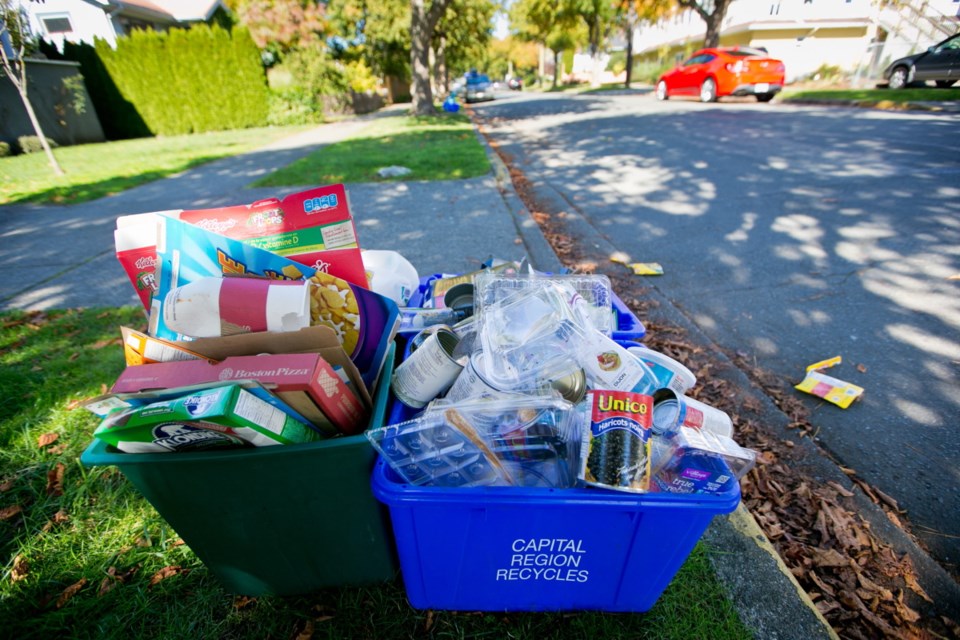 They might ban glass from your curbside recycling next year, and I am outraged. Or maybe delighted. Really, I don’t know anymore.
They might ban glass from your curbside recycling next year, and I am outraged. Or maybe delighted. Really, I don’t know anymore.
The Capital Regional District’s environment committee, bucking a recommendation from staff, wants the recycling trucks to stop picking up glass as of Jan. 1.
Good idea? Bad idea? Having spent the past quarter century dutifully Pavlov’s-dogging our glass containers out to the curb, this about-face is disconcerting.
More broadly, with 60 per cent of my home now given over to the sorting/storage of various types of disposables, it would be nice to have faith that I’m doing the right thing.
As it is, our house has a box for newspapers, a bag for tins and hard plastics and another for glass.
We also have the traditional garbage bag under the sink, which is where everything used to go but is now largely ignored and empty — the Reno, Nevada, of the waste-disposal world.
In part, such bags are empty because there’s a whole list of hazards you’re not supposed to chuck in your garbage anymore: paint, pharmaceuticals, batteries, biomedical waste… . These items may be disposed of only by A) sticking them in someone else’s trash can at work or B) flushing them down the toilet, which is why the shellfish off Victoria are all C) toxic as your first marriage and D) addicted to prescription painkillers. Please don’t flush.
Our house also has a high-tech compost bucket, a gift from my sister. The secret of successful composting is to ignore the overflowing bucket (just as one would an empty toilet paper roll) in the hope that someone else will deal with it.
Eventually one of us will give up and shuttle the compost out to one of those big black backyard bins that looks like a Dalek from Dr. Who. When I dump the compost I like to intone “Exterminate! Exterminate!” in a robotic voice, which causes nervous neighbours to hurriedly shepherd their children into their homes. Apparently they are unfamiliar with Dr. Who. Their loss.
We also have a kitchen-scraps bucket for the kind of food waste — cooked stuff, meat, grease, cheese — that you don’t want in your compost in case it attracts rats or raccoons or senators from Prince Edward Island.
The capital region’s kitchen scraps are shipped either to Cobble Hill, where the material is transformed into organic compost, or to the Lower Mainland, where it is converted to sewage, trucked back to the Island and dumped in Esquimalt when no one is looking. No, no, no, it is “anaerobically digested to produce green energy,” which conjures up images of a 1980s Jane Fonda workout video.
Our house also has a separate container for crushed eggshells (which I think are used to keep slugs out of the garden), another for coffee grounds (which are collected for purposes unknown to me) and yet another for soft plastics and styrofoam meat trays.
Disposing of the latter involves A) driving it to some volunteer-run depot on a Saturday morning when you would rather be binge-watching Netflix and B) paying good money to get rid of stuff that you could have stuck in your garbage can for free. What they do with the plastics and meat trays, I don’t know, but I feel like a Suzuki-level eco-saint every time I pull out a $5 bill.
Returnable containers — beer, wine, liquor — may be disposed of by A) leaving them on your front porch for the high school band class to pick up and B) running back to the porch 10 minutes later to add a note explaining that these are five years’ worth of empties, so the band class should refrain from making value judgments.
Such empties are also at the heart of the CRD environment committee’s proposal to discontinue curbside glass recycling.
The push is coming from the bottle depots, who argue that too many containers that could be returned for deposit are going to the recyclers instead. The recyclers, meanwhile, are insisting that glass be kept apart from other recycling because too much smashed glass is getting mixed up with the other materials, and vice versa. That’s why you are now asked to put your glass in a separate container at the curb.
CRD staff balked at the idea of ending curbside glass recycling altogether. The problem with doing so, they argue, is that it assumes people will not only return their returnable bottles for deposit but take non-refundable glass containers to depots, too. Faced with making that effort, there’s a pretty good chance people will just chuck recyclable glass in the garbage instead.
The politicians on the environment committee disagree. They have recommended ending curbside collection of glass Jan. 1.
Dunno about that. Recycling works best when it’s easier and cheaper than the alternative. And after a quarter century of convincing people to use the blue box, good luck persuading them to stop.



